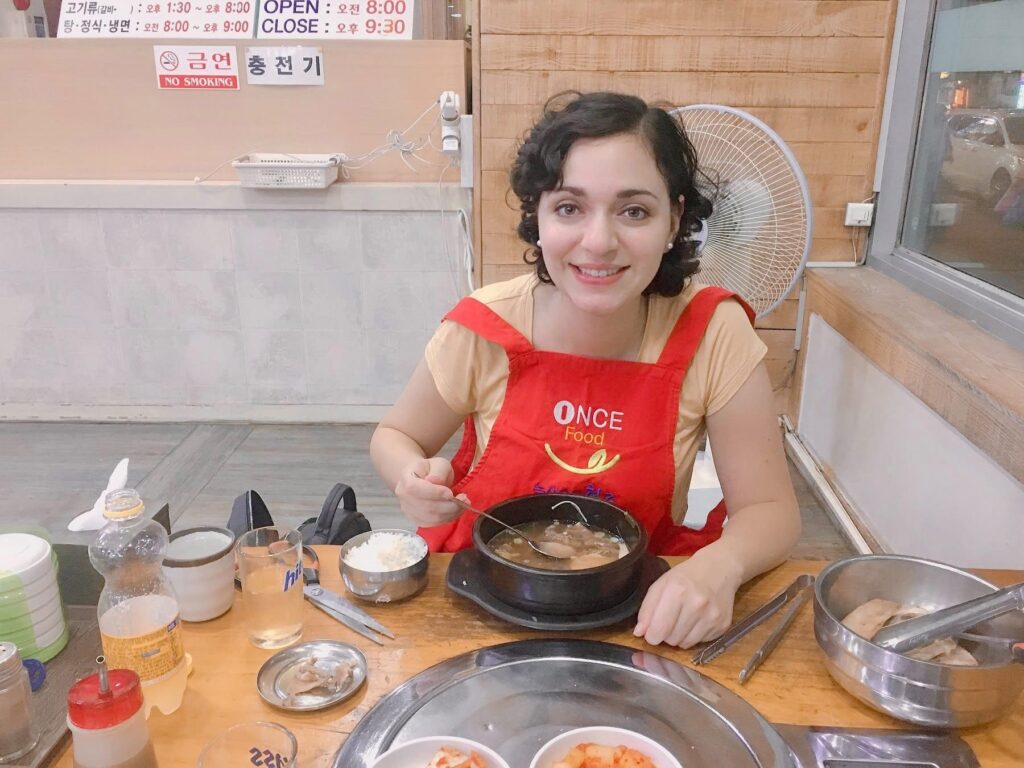By: Samantha DiVito, Teach Abroad South Korea EPIK Alumni
Whether you’re already excitedly packing your suitcases or just beginning your application journey for a new life as a public school teacher in EPIK, it never hurts to get the insight of someone who has been there, done that. I taught for two consecutive years in EPIK in gorgeous Chungbuk, a province located conveniently in the center of South Korea, from August 2018 to August 2020. Clearly the experience changed my life and made me fall in love with this dynamic country because I married a Korean and never left! With some time to reflect on what worked for me and helped me settle in to make the best of my EPIK years, and also with reflection on what I wish I had skipped or handled differently, here is my list of the best dozen pieces of honest advice I have to offer. Good luck with wherever your EPIK journey takes you!
- Be open-minded about your placement. With EPIK, unlike selecting a job at a hagwon, you do not get to choose where in the country you will be placed. EPIK might ask you for preferences and make some offers, but you can’t outright tell them where to put you. I requested Gwangju, a major city in the south, and got placed in a lesser-known province. And by “lesser known” I mean I had never heard of it and bawled my eyes out on the sofa dramatically when I found out my placement. But, as it turns out, Chungbuk is a fantastic, beautiful place to live with wonderful people, culture, easy transportation to anywhere else in Korea, and opportunities to really make a difference in the lives of children. It wasn’t as rural or isolated as I had feared – not even close! And I made wonderful friends and memories for two years there. I still think of it as my Korean hometown. So don’t rush your judgment if you don’t get the placement you had hoped for.
- Make other EPIK teacher friends! These will be foreigners who are having a shared life experience and are therefore easy to talk to about your time in Korea. Hopefully you can meet many of them at orientation and then later meet some EPIK veterans who are already in your city or province.
- Accept that culture shock will absolutely happen in some form or another during your first year and do your best to work through it. Here’s where you and your EPIK friends can lean on each other for support. For me personally, I was in a fog of having so much fun and trying new things for the first six to nine months that I didn’t start experiencing real, deep culture shock until that point. After some time, I got through it, and you will too!
- Make Korean friends. Of course! They could be your co-teachers or other coworkers at school. Maybe you could meet some people through local language exchange meet-up programs (which are usually held at cafes or bars) or language exchange apps like HelloTalk, which is where I met most of my longterm Korean gal pals. Why bother going abroad if you’re not going to make friends there? It’s a rich friendship opportunity that can’t be missed. I found a core handful of friends who I have really bonded with over shared interests or perspectives. We have made great memories together from attending concerts, going on vacations together, and showing up for each other’s big events like weddings.
- Learn your students’ names when possible! Especially if you’re teaching at any really small schools or have small class sizes. One semester, I had about 500 students so I really couldn’t memorize all their names. But at one of my schools, I only had a total of 15 students so I learned their names right away.
- Put your best foot forward teaching. Sure you might be taking the EPIK job for the culture or travel experience, but this is a job and you will be a full-time teacher in public schools so you shouldn’t take it lightly. Utilize the skills that you learned and practiced before you arrived such as from your TEFL course, prior teaching experience, volunteer teaching experiences, and EPIK orientation. Take it seriously.
- Lean on your EPIK friends for resources. You’ll be at different schools but keep the Kakaotalk group chats going by sharing game PPTs, activities, English camp ideas, and other resources, and asking each other for any kind of troubleshooting help when needed. You’re not alone!
- Develop positive relationships with your Korean coworkers. This is especially important for your actual co-teachers but is also true in general for the homeroom teachers, vice principals, and main office staff as well. From day one, go in with a smile and be polite, even if you can’t speak Korean yet. With your co-teacher(s), try to avoid conflicts if you can with proper communication and flexibility. For some co-teachers, this may be their first time working with a foreign teacher. Even if it isn’t, they maybe didn’t choose the position and feel nervous or overwhelmed about handling things like translating for you in front of students, or arranging your housing, etc. Be patient with them. You don’t have to be best friends, but you definitely want to keep it positive to keep the work environment a happy place.
- Try to learn Korean if you haven’t already. Hangeul (the easy Korean alphabet) is a must along with polite Korean and the basics to get by. How far you choose to pursue your studies beyond that is up to you, but always saying greetings and thank you’s in Korean to your co-teacher and vice principal when you see him or her, as well as trying to ask little questions or say something funny in Korean, can go a long way at school! Learning the language will also make your life outside of school way easier, especially if you are placed in a province rather than a major city. Consider self study or signing up for a class in your neighborhood with other new EPIK teachers. I’m happy with how I immediately learned hangeul, survival Korean, and grammar, but I spent years being afraid or nervous to try to have conversations and it delayed my language abilities by quite a bit. Don’t make the same mistake I did!
- Use your vacation time wisely. While I understand some people may choose to stay home during vacation time for a variety of reasons such as saving money to pay off student loans, I really do encourage EPIK teachers to travel around Korea or beyond. EPIK has a lot more vacation time than hagwon jobs, which is one of the wonderful benefits of the program. When I was in EPIK, I traveled abroad each winter break and each summer break, and then I traveled within Korea via bus or train for long weekends and other holidays. Korea is a very short plane ride from anywhere in Japan as well as northeast mainland China, and isn’t far from Taiwan, Hong Kong, Guam, and southeast Asia.
- Keep track of your completed lesson plans for each grade level and each school. (If you’re placed in a province, you will likely have more than one school to visit each week, and everyone I knew taught multiple grade levels.) You’ll want to do this so you can remember where and when you’ve already used a certain game, theme, or activity. One easy method to keep track is a Google spreadsheet like I made for each of my schools. I used the spreadsheet both years I taught in EPIK. Staying professional and organized is easy with any sort of online tool like a spreadsheet, and you’ll be glad you did this.
- Renew your EPIK contract at least once! I’ve always firmly believed that one year in the program just is not enough to fully grow as a teacher, experience what Korea has to offer, adjust beyond the inevitable culture shock, and check off all the amazing things off a bucket or to-do list. I knew a few teachers who very firmly showed up on day one knowing that they could only spend one year here no matter how much they loved it, but I knew a lot more people who came thinking they’d only do one year but actually stayed for two or three. And plenty of my friends stayed beyond three years as well. Who knows, maybe you’ll never leave like me…!





Your writing is like a breath of fresh air in the often stale world of online content. Your unique perspective and engaging style set you apart from the crowd. Thank you for sharing your talents with us.
Your blog is a treasure trove of valuable insights and thought-provoking commentary. Your dedication to your craft is evident in every word you write. Keep up the fantastic work!
먹튀 감정을 통해 안전한 카지노사이트에서 안심하고 베팅하세요.